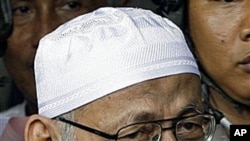Prosecutors in Jakarta are expected to finish presenting their case this week in the trial of accused Indonesian terrorist Abu Bakar Bashir. The trial is seen by many as a test of Indonesia's judicial system to strongly deal with violent extremism.
The prosecution has filed seven charges against Abu Bakar Bashir under Indonesia’s Anti-Terror Law of 2002, including "inciting a terrorist act" and "trafficking in weapons and explosives for the purpose of conducting terrorism." If convicted, the radical Muslim cleric could face the death penalty. He is also charged with supplying funds for terrorism, which carries a jail term of between three and 15 years.
The charges surround Bashir's alleged role in al-Qaida in Aceh, a terrorist group that was discovered operating a militant training camp in the northern Indonesian province on the island of Sumatra in 2009. According to Indonesian police, the group was planning attacks on foreign embassies and assassinations of Indonesian government officials, including President Susilo Bambang Yudhoyono.
Harkristuti Harkrisnowo is a criminal law professor at the University of Indonesia and is the director general of human rights at the Ministry of Law.
She says Bashir helped the government's case by defiantly admitting his support for violent Jihad, or holy war, to impose Sharia law in Indonesia. She says the prosecution succeeded in showing Bashir's role inciting, funding and planning terrorist attacks.
"Bashir has confessed that Jihad is part of a deed of being an Islamic leader. He did confess that he generated money from different sources in order to fund this activity and I think several of the witness already provided testimony that they did support, they did give money for Jihad," she said.
Criminal lawyer Frans Winarta is a member of the National Law Commission of Indonesia and chairman of Peradi, the oldest lawyer association in the country.
He says the defense attorneys so far have not tried to directly to confront the evidence presented. Instead, he says, they have charged bias on the part of the judges and focused on procedural issues like allowing testimony from witnesses in other locations using a live televised video. Winarta says it was done for security reasons and has been used in other trials.
"It is unusual to do that but there is a precedent in the past that even in corruption cases you can do that, you see. But there is no regulation on that, unlike the law on terrorism. There was a provision that allows cross examination to let's say a distant cross examination, not in the court," Winarta explains.
The other line of defense, Winarta says, has been to claim that the Indonesian government has no jurisdiction in Aceh province, the area were al-Qaida in Aceh was operating. As part of a negotiated settlement to end a decades-long insurgency, Aceh province was granted a degree of autonomy in 2006 and has implemented a number of Sharia based laws. But these legal scholars say Aceh's autonomy does not apply in this case.
The defense will soon get the opportunity to make its case. The panel of three judges will then decide if they have heard enough to render a verdict.
Both legal experts say a conviction is likely, but Winarta does not expect Bashir to get the death penalty or even a life sentence. "The problem is, does the government have the courage to give a heavy sentence because if you look into other cases in the past. His sentence was, can you remember, two years or four years, right?" Winarta said.
In 2003 Bashir, a founder of the radical Jemaah Islamiyah movement, spent 20 months in prison for immigration violations. In 2005 he was sentenced to two-and-a-half years for his role in the 2002 Bali terrorist attacks. This sentence was eventually reduced and the conviction overturned by Indonesia's Supreme Court.
Harkrisnowo says the judges will take into account both the 72-year-old Bashir's age and the degree of his involvement in terrorist activities if he is found guilty. "I think this is also related to the charges that were brought against him, which is not under the terrorism itself but in aiding and abetting. And secondly I think that the age of Bashir that is 70 something might be one of the issues that will be considered by judges as well," Harkrisnowo stated.
While a short sentence may frustrate some of Indonesia's allies in the war on terror, a guilty verdict of any kind could draw violent responses from Bashir's supporters. But Harkrisnowo and Winarta say the judicial system must not allow political ramifications to influence the proceedings, so that the verdict will be seen as independent and legitimate by most Indonesians.
Prosecution Makes Its Case in Indonesian Cleric's Terrorism Trial




